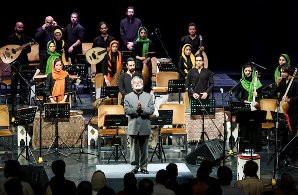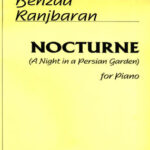
The National Instruments Orchestra of Iran performed its first concert amid much hope and anxiety on July 18, 2015. The Orchestra is founded by Roudaki Cultural and Arts Foundation which is a semi-private foundation in Iran. The Arts Director for the National Instruments Orchestra of Iran is Ali (Alexander) Rahbari and the Orchestra Executive Director is Sadjad Pourghand.
The National Instruments Orchestra of Iran can be considered as an evolution upon Faramarz Payvar’s Orchestra, established in 1968, and the Plectrum Orchestra which was founded by Hossein Dehlavi in 1993. The feature which these three orchestras share with each other is the support they received from state organizations.
One of the most significant orchestras on such a large scale, as the National Instruments Orchestra of Iran, was Simorq Orchestra founded by Hamid Motebassem an Iranian composer and Tar and Setar player. Simorq Orchestra, a private one, could stage several performances in Iran and even embarked on a concert tour in Europe. Hamid Motebassem also served as the concert soloist for his own piece entitled “Vanoosheh.”
Hossein Alishapour and Vahid Taj were the concert singers whose performance drew the audience’s admiration.
The National Instruments Orchestra of Iran includes both plucked, bowed, wind and percussion instruments: Tar, Bam Tar, Setar, Santour, Qanoon, Oud, Kamancheh, Gheichak, Bass Gheichak, Alto Gheichak, Ney, Dayereh, Daf, Tonbak.
The Orchestra was conducted by Iranian conductor Esmaeel Tehrani. Tehrani who is in his late 60s was born in Tehran and is a graduate from National Music Conservatory of Iran. He plays santour and is a composer as well.
The concert repertory included compositions by five generations of composers who follow Ali Naghi Vaziri’s school of thought. One of the most prominent composers of Vaziri’s school of though is Hossein Dehlavi. For this reason, the concert was opened with Dehlavi’s “Nokhost Golbang-e Mezrabi (for plectrum orchestra)” as a tribute to the composer.
Given the disputable belief that the Iranian classical music is unison by nature, the National Instruments Orchestra of Iran was convened to perform polyphonic Iranian pieces composed for all the above-mentioned Iranian instruments.
The concert brochure reads:
Based on ethnomusicological evidences, Iran is one of the few countries which possess national classical music. In all the years that the Iranian classical music has been developing in terms of performing and composing techniques, need for a state-owned orchestra which would be capable of performing polyphonic Iranian music was highlighted.
However, the issue was never addressed in a sustainable manner. In other words, orchestras which were established for performing the Iranian classical music had brief existences due to different problems such as budget shortage, lack of state support.
One of the challenges this orchestra is dealing with is the lack of pieces composed for an orchestra with such a capability in terms of versatility and inclusiveness of Iranian musical instruments as an instance.
Although the National Instruments Orchestra of Iran still has to walk a long way to attract its audience from the public, its goal and path is well understood and appreciated among the majority of the Iranian musicians including those who deny it









